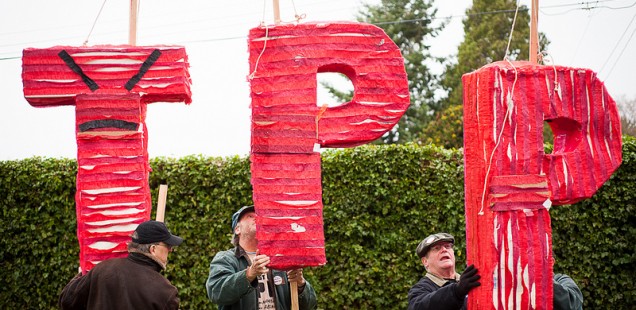What is the TPP? (The Big Brother of ACTA Explained) | PirateTimes

What is the TPP? (The Big Brother of ACTA Explained)
Currently under negotiations is an expansion of the Trans-Pacific Strategic Economic Partnership, a Pacific orientated trade agreement composed of Brunei, Chile, New Zealand, and Singapore. Eight additional prospectives have joined negotiations for membership, which would expand the agreement to Australia, Canada, Malaysia, Mexico, Peru, the United States, Vietnam, and possibly Japan. As suggested by proponents, once finished the Trans-pacific Partnership (TPP) will have implemented liberalized economic and trade policies throughout the Pacific coastal members. As with all trade-blocs, however, there are grave concerns over democracy, transparency, and privacy, with intellectual Property measures mimicking and even exceeding the notorious ACTA (Anti-Counterfeiting Trade Agreement).
Ironically the terminology used in trade-bloc “liberalization of trade” is quite the opposite of its use during the creation of our global liberal system. During the Bretton Woods system (post-WWII environment) both trade-blocs and intellectual property were more likely to be seen as illiberal. Only in the past two or three decades has “liberal” taken on new meaning. The new form provides the means to bypass democracy domestically as well as globally and pushes nations to protect their increasingly monopolistic Intellectual Property industries over the concerns of individual citizens.
As there is already a global trade agreement in the World Trade Organization (WTO), trade-blocs are a means to push through difficult policy in a more local arena—policy even too “liberal” for the commonly criticized WTO. Negotiated behind closed doors by bureaucrats and sometimes industry, these agreements have a nature of being very nontransparent and undemocratic. The TPP is no exception to this. By placing these laws within a trade agreement, negotiations can take place outside the public’s view as was the case with the ACTA. While the ACTA ultimately failed, its spirit still lives on, hidden under the guise of trade partnership—a common political tactic to push through and hide policy the public cannot swallow as well as force politicians to accept or reject en masse with other important legislation.

CC-BY-ND, GlobalTradeWatch
As the U.S. has historically been a fierce negotiator for its favored policies, citizens of the remaining members will see a strengthening of IP enforcement upon completion. This allows domestic governments to place blame outside of their state while accepting the obligation of enforcing these decisions in a very undemocratic manner. All states face this decrease of political accountability, which is increased by enforcement mechanisms in the agreements. This makes it much more difficult to undo than a domestic law that has no international component. The permanence of these agreements provide the need to negotiate in secrecy as there is an urgency in pushing through law that cannot easily be undone.
Developing members of the TPP will face a maximalist interpretation of Intellectual Property laws that are standardized throughout the partnership, doing away with flexible and sovereign solutions that reflect the domestic situation. TPP signatories will not, however, simply be facing adoption of U.S. based Intellectual Property laws. Instead, all members, including the U.S., will be agreeing upon laws based on the ACTA, and in some cases beyond. These include:
- Bypassing the multilateral ICANN, Country Code top-level domains will be placed under TPP rules, limiting the sovereignty each member state has on their domain (.uk, .se, .de…etc)
- Expands scope of copyrights based on U.S. Law and further
- Adopts U.S. Length of copyrights of 70 years after author’s death, 95 years after publication, or 120 years after creation. This goes far beyond the minimum of TRIPS of 50 years after publication or 50 years after creation.
- Extends liabilities of those who facilitate copyright infringement as well liability of ISPs beyond both U.S. Law and the proposed ACTA, while limiting the freedom to make exceptions
- Extends liabilities to ISPs and other intermediaries and provides incentives to ISPs to assist copyright owners in deterring infringers and monitoring users
- Allows authorities to seize “suspected” counterfeit or pirated goods without individual identification, contrary to the U.S. 4th Amendment
- Eases the process of applying for patents while making it more difficult to challenge
- Expands and eases the ability to “evergreen” patents—the process of renewing patents by a minor alteration in the product.
- Extends the scope of what can be patents and restricts the ability to revoke patents, forcing each state to allow patents for plants, animals, and treatment methods and limiting their ability to exclude subjects
- Broadens the scope of copyright infringement
- Prescribes both imprisonment and monetary fines beyond compensation of the infringement to one of deterrence, based on ACTA prescriptions[i]
- Corporations will be able to sue governments based on the TPP rules written for corporations, thus bypassing democracy and sovereignty
These are just some of the proposals that only due to a leak, were available to the public. In short the TPP is a nontransparent agreement that greatly empowers corporations, especially the Intellectual Property industries, at the cost of democracy, sovereignty, and freedom. Even those outside the agreement are facing an increased expansion and acceptance of laws and norms in the TPP. The slow creep of trade agreements bypasses the already unbalanced rules from global organizations, causing greater concern by empowering corporations to the detriment of individuals like us.
[i] All prior summary of laws from Flynn, Sean et al. (2012) Public Interest Analysis of the US TPP Proposal for an IP Chapter. Northeastern University School of Law Research Paper No. 82-2012; American University, WCL Research Paper No. 2012-07. Available at SSRN: http://ssrn.com/abstract=1980173 or http://dx.doi.org/10.2139/ssrn.1980173
Featured image: CC-BY-NC-SA, Caelie_Frampton

About Michael Wartenbe
I am a Florida native and member of the Florida Pirate Party. I currently live in Miami where I am working on a PhD in international Relations. I became interested in the Pirate Party when simply studying politics was not enough and because the movement focuses on a sometimes confusing and often forgotten side of our current economic environment–Intellectual Property, which is sure to become an exponentially important topic for the future of our societies.
All content is CC-BY if not mentioned otherwise. Please link back to us if using content.
-
- Pingback: What is the TPP? (The Big Brother of ACTA Expla…()
-
- Pingback: Will Abbott hand power to multinationals? » Precarious Climate()
-
- Pingback: ¿Qué es el TPP? (La explicación del “Gran Hermano de ACTA”) | Piratas de Madrid()
-
- Pingback: The Plutocracy of Copyright Holders | PirateTimes()












Recent Comments